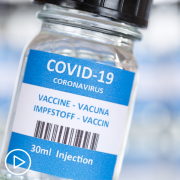How Does COVID-19 Create Sleep Issues for Cancer Patients?
Are you having sleep problems during the COVID-19 pandemic? A recent Swiss study showed that people’s sleeping hours are more regular during the global crisis, but self-reported sleep quality has decreased, according to Science Daily. Besides that, some groups like cancer patients are more likely to experience sleep deprivation during such challenging times.
There are several factors that might affect the sleep quality of people diagnosed with cancer. They include the diagnosis, cancer treatments, medical bills, and an uncertain future. Stress and anxiety due to coronavirus disease can also cause a disruption of everyday schedules. Sleep disorders themselves can worsen cancer symptoms, which creates a vicious cycle.
Cancer Survivors and Sleep Disorders
Getting a good night’s sleep can already be tough for cancer patients. Studies show that over three-quarters of people with severe disease have sleeping problems, according to the Cancer Treatment Centers of America.
The good news is today’s scientists and physicians have a better understanding than in the past about how sleep works and how to improve sleep quality.
Sleep provides many health benefits for overall physical, mental, and emotional health. This is especially true for people battling severe diseases like cancer. For example, it can boost your body’s immune system, which makes it more effective at fighting off cancer cells.
On the other hand, lack of sleep can have the opposite effect. This can weaken the immune system and slow down recovery from sickness or injury. Serious sleeping disorders can also create an imbalance of the cell-impacting hormones cortisol (stress hormone), and melatonin (sleep hormone).
Sleep: Its Influence on People Living with Cancer (video)
Other Effects
Besides affecting cancer cells and tumors, poor sleep can also have other negative effects related to:
- Obesity
- Diabetes
- Heart disease
- Heart attack/stroke
- Mental health
- Sleep
One theory is that melatonin might be the root cause that affects these health conditions and episodes. However, more research is needed. The body normally produces more melatonin at night as it gets dark outdoors and the human body winds down for rest and repair.
COVID-19 and Sleep Problems
Fun Fact: The acronym COVID-19 stands for corona (CO), virus (VI), disease (D), and 2019 (19). There are various possible factors related to the global epidemic that might affect people’s sleep, even if they haven’t tested positive for respiratory disease:
Anxiety, Stress, and Depression
The ongoing COVID-19 outbreak has become a global financial crisis that could cost the United States alone $16 trillion, according to the Los Angeles Times.
Quarantines, layoffs/furloughs, and school closures have caused stressful situations for people, and it’s even worse for those with severe diseases like cancer.
Even indirect factors like COVID updates have created more stress and duress. This is why it’s important to avoid reading or watching daily news after 7 PM or so. Negative news can affect your psyche and make it tougher to doze off at bedtime. A better option is good news.
Disrupted Daily Doings
The “new normal” during the ongoing pandemic might affect the quality of sleep. More stay-at-home time can cause wholesale schedules in daily schedules. That, in turn, can result in a sedentary lifestyle of sitting down and fewer gym workouts. This can negatively affect sleep unlike the option to make the right selection of mattress.
Blue Light
Studies show that blue light from sources like computer monitors, mobile devices, and fluorescent light bulbs can disrupt people’s sleep patterns.
Besides that factor, people might have more screen time during quarantines and lockdowns as they use their PCs/Macs, tablets, and smartphones to get COVID updates
and interact with friends and family. This can increase the risk of tossing and turning due to insomnia.
COVID-19, Sleep, and Cancer: It’s Complicated
As noted, several factors can negatively affect the sleep quality of cancer patients. When you add factors like a worldwide pandemic to the mix, this situation becomes ultra-complex.
Coronavirus and Sleep
The ongoing COVID-19 crisis isn’t just about the contagious virus itself, which makes it a whole lot more serious than a sleepless night when counting sheep and a warm glass of milk doesn’t seem to work.
Here’s the problem. Your ability to fall asleep and stay asleep during a pandemic probably isn’t related to the respiratory condition itself. Instead, it’s the effects of everyday life that have been turned upside-down because of the virus.
The effects of a global pandemic can include different factors related to work, school, and home. People can also experience emotional problems like worry, anxiety, and depression. Besides affecting your sleep schedule, it can even negatively impact your general health. So it’s a double-whammy.
COVID-19: The Importance of Sleep (video)
Stress and Sleep
While taking steps like picking a comfortable mattress can help you sleep like a baby, stress can have the opposite effect. In fact, insomnia can affect your ability to fall asleep and stay asleep, according to the Cleveland Clinic.
Stress triggered by stress hormones like cortisol can affect various biological processes, including sleep. If you’ve already received a cancer diagnosis, then a viral pandemic can make the situation even worse.
Pandemics and Sleep
The current pandemic can increase stressors and create an uncertain future due to the disruption of everyday life. This is due to extraordinary changes to daily life, including social distancing, virtual work, and home-schooling.
More Sleep for Cancer Patients During COVID Quarantines
Cancer survivors can take some basic steps to get more shut-eye during the current quarantines/lockdowns:
Sleep-friendly Environment
Dark, quiet, and cool rooms can all help to help cancer patients get a good night’s sleep during a global pandemic. It’s important to create a sleep-inducing environment that can help you fall asleep, and then cycle through the five sleep stages multiple times. If you dream you’re probably in ‘deep sleep.”
There are various steps you can take:
- Minimize artificial lighting with options like night lights and dimmer switches
- Clear your mind of everything and focus on falling asleep
- End all daily news consumption before 7 PM
- Use heavy curtains and blinds to block outside light
- Avoid heavy meals, exercise, and caffeine/alcohol close to bedtime
- Ditch all thoughts about the current COVID-19 pandemic
- Use aromatherapy through sprays, diffusers, and massages at bedtime
- Delay dealing with personal problems until the next day
- Eliminate loud sounds and use sleep aids like noise machines
- Do meditation, yoga, or light exercise to prepare for bedtime
- Use self-mantras to help you doze off when your mind races
- Lower the thermostat to about 65°F (18°C) to promote quality sleep
Conclusion
Dealing with the year-long COVID-19 pandemic can be tough enough. The predicament becomes even tougher for cancer patients who must also handle disease-related issues like cancer diagnosis, symptoms, and treatments. That’s why it’s so important for survivors to take steps to stay calm, boost their immune system, and get a good night’s sleep. Sleeping well can help you fight the coronavirus while you battle cancer.
Brett is a writer at ID-Mag. An enthusiast and expert when it comes to sleep products, Brett dedicates a lot of his time reading, researching, and reviewing about both traditional and emerging sleep brands that manufacture varied types of sleep products – from eco-mattresses, smart pillows to cooling sleep systems, Brett has probably reviewed them all. Brett also finds sleep especially important since he juggles a small business which he runs from home, makes sure he spends time with his daughter and he also writes during his spare time – you can definitely see that he needs a great forty winks all night, every night so he’ll make sure that you get great sleep, too!










